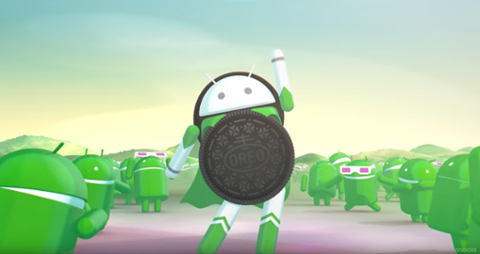Google I/O starts May 7 in Mountain View, California at the Shoreline Amphitheater. The three-day event will touch on all things Google, from Android Q to machine learning and the company’s Pixel hardware. But what should you actually expect the company to unveil onstage?
Android Q… uince?
Android has a dessert-naming scheme, and as Rosie Perez taught us in the ‘90s, there just aren’t many foods that start with the letter ‘Q.’ So what’s it gonna be?!
Google I/O won’t bring us the name, because the company stopped doing that. If the past few years are any indication, it’ll use I/O as an invitation to name the next version of Android, then ignore our suggestions and do what it wants.
Early Android betas are full of API changes meant to help developers transition their apps to the next version, and Q will be no different. There are also a lot of slight interface tweaks with Q (that remind us of Flutter). Plus, Q has a new ‘bubbles’ interface for multitasking, which is a copycat of Facebook’s old ‘Chat Heads’ feature. There’s been nothing major, in other words.
We expect Google is saving major announcements on Q for the keynote, though it’s not clear to anyone what meaningful changes will come. Ars Technica took a deep dive into Android Q and came up with a lot of UI tidying. We’re expecting a system-wide dark mode and some significant privacy-facing features baked right into the system proper. If folding phones are actually going to take off, we expect Google will make some changes to Android Q to better support them, much like it did when screen notches became relevant.

Pixels
Hardware hasn’t been kind to Google. The Pixel lineup has a ton of issues, and it’s not a massive money-maker (yet). In the most recent Alphabet earnings call, Google CEO Sundar Pichai hinted a lower-cost Pixel – likely the ‘Pixel 3a’ – will be launched at Google I/O. (If we’re being speculative, this may be a device Google gives each attendee.)
There’s also the Pixel Slate tablet and Pixelbook to consider. The triumvirate make up Google’s hardware lineup for mobile and computing, and are meant to serve as conduits for cross-platform Android apps. But the Slate was not well received, and Pixelbook is still a Chrome OS device. We’re not sure there’s enough excitement for either to warrant anything announced during Google I/O.
Stadia Details at Google I/O
When Stadia was announced, it was little more than a demonstration of an idea. Google wasn’t launching it yet, and had nothing to offer us in terms of details about how developers could publish games to it. (We also have no idea what the revenue split will be for developers and Google.)
I/O should bring us some news on this front. In the keynote, we expect Google to (again) brag about how cool Stadia will be for users. If you’re a game developer, keep a careful eye on sessions; we expect Google to discuss the meaty bits far away from the main stage; Stadia’s revenue split and other details will likely pop up later during I/O.
Why keep things quiet? This is likely because the nuts and bolts of publishing to Stadia and earning an income will likely favor big studios with AAA titles, not indie developers making really fun games with 8-bit graphics. The less attention paid to how revenues split, the better it is for Google.

Google Assistant & Smart Home
We could see more hardware in this arena, too. The Nest Hub Max is a rumored 10-inch display with speakers for your home. Much like Facebook Portal, Google seems to think having a massive tablet-size screen docked on your counter is a great idea.
It’s all driven by the Google Assistant, which is essentially a voice-activated search bot. Is a screen necessary for Google Assistant? No. But if Google is building on its already-creepy bot’s capabilities for the future of the smart home, a screen is helpful. It allows the Assistant to show and tell, which is a fun exercise for something about as smart as a first grader.
Machine Learning (And Hester Mofet)
(Yes, ‘Hester Mofet’ is a Silence of the Lambs reference. We’re doing 90's references today, can’t you tell?)
Google loves to say ‘teraflops’ on stage during keynotes, so expect a lot of talk around machine-learning server hardware. That typically leads into new tools and services for TensorFlow, Google’s favorite child of late.
If you’ve been observing TensorFlow, you know it routinely adds small features and tools. It’s a service that gets better almost daily. Expect a recap of what’s been going on; we’re not sure if there’s a big machine learning announcement in the offing, though.
As for ‘ol Hester Mofet – ‘the rest of me’ – we’re assuming Wear OS will get some shine, as will Chrome OS. Google’s own apps will likely get some new features and some keynote time, and we’d like to see more around ARCore, Google’s augmented reality framework for Android. In fact, don’t be surprised if ARCore goes cross-platform as we head into the heads-up display era for augmented reality. I’m sure Google would love a meaty slice of the iOS pie, too.



